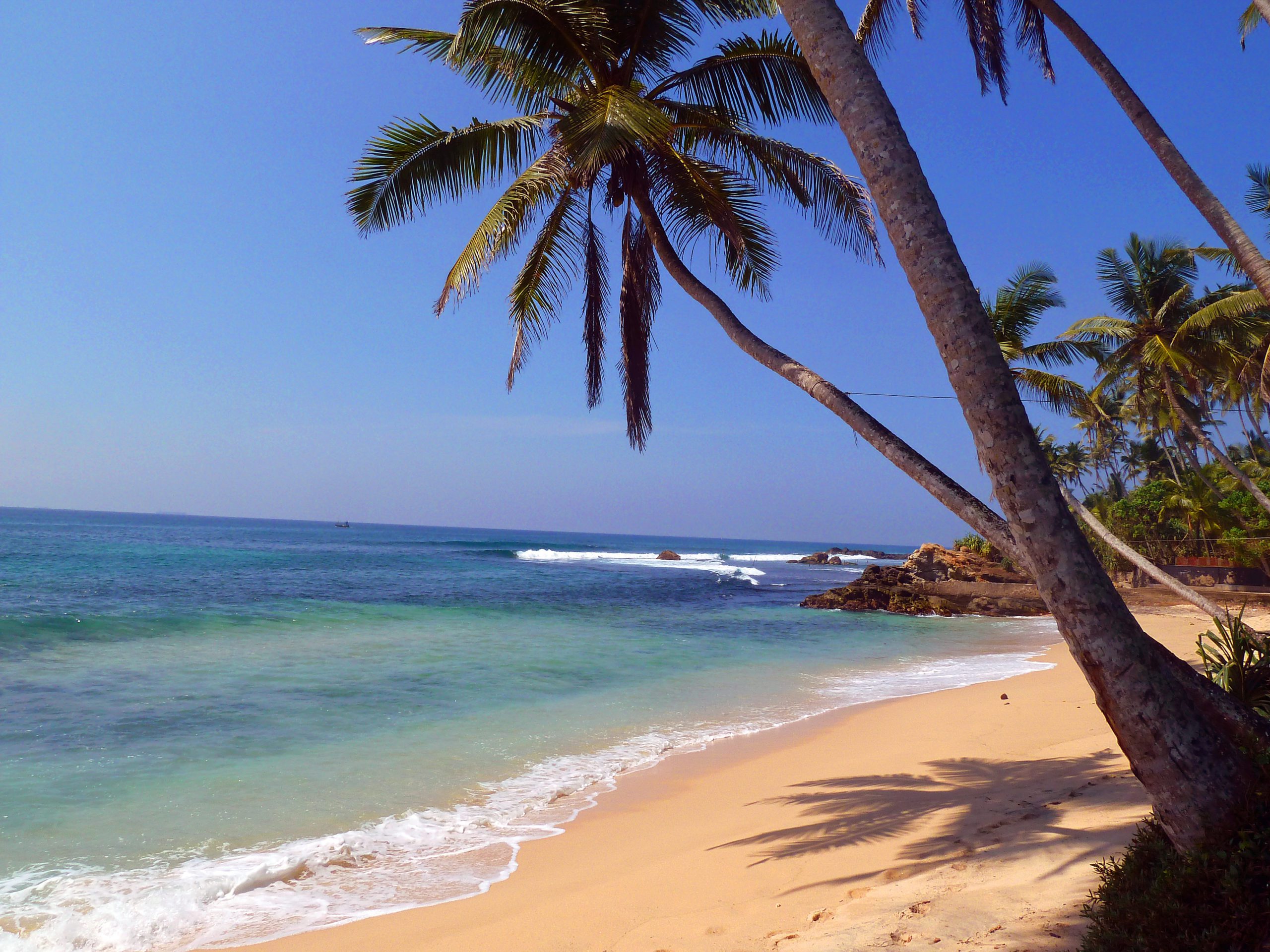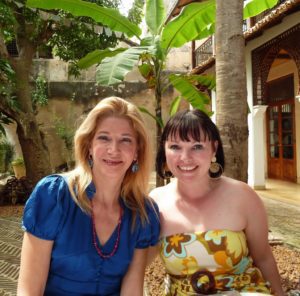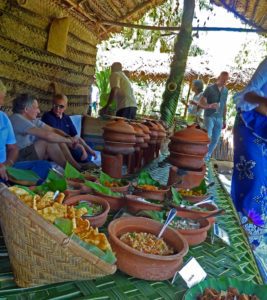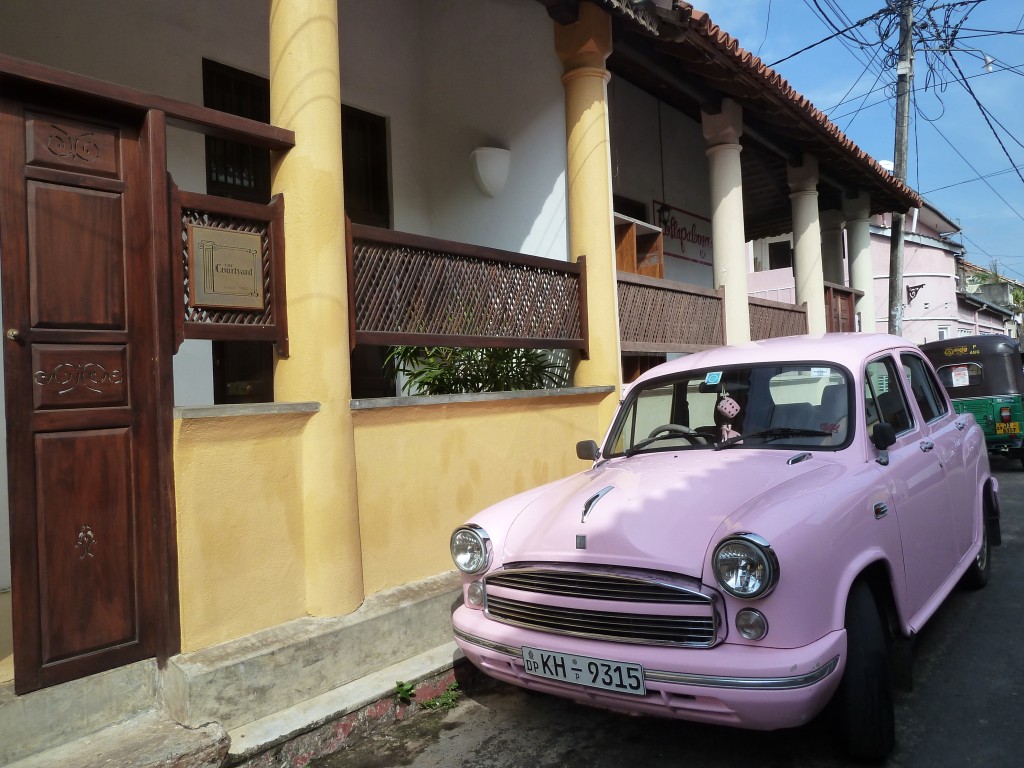
During Sri Lanka’s Galle Literary Festival in 2011, I was thrilled to meet Candace Bushnell, the author of Sex and the City. The only way to arrive at her Sex in a Sarong party on Taprobane Island was to wade through the sea – it certainly wasn’t the entrance I had planned for a soiree with the best-selling author during the Galle Literary Festival.
 Fireflies flit along the shoreline as I step out into the Indian Ocean where the water is as warm as the sky is midnight blue. The tiny Taprobane Island off Sri Lanka’s southern tip flickers in candlelight as we wobble our way along the watery path lit by fire torches and the moon. Despite the crashing waves threatening to send us adrift, we steady ourselves by gripping the sand bank with our toes. Just as the final metre of the path dips further into the ocean, friendly hands reach out to save me from total submersion. A slippery climb up a ladder rewards us with a sea of soggy sarongs and cocktails, as you’d expect at a magical party called Sex in a Sarong.
Fireflies flit along the shoreline as I step out into the Indian Ocean where the water is as warm as the sky is midnight blue. The tiny Taprobane Island off Sri Lanka’s southern tip flickers in candlelight as we wobble our way along the watery path lit by fire torches and the moon. Despite the crashing waves threatening to send us adrift, we steady ourselves by gripping the sand bank with our toes. Just as the final metre of the path dips further into the ocean, friendly hands reach out to save me from total submersion. A slippery climb up a ladder rewards us with a sea of soggy sarongs and cocktails, as you’d expect at a magical party called Sex in a Sarong.
The guest of honour is adorned in a sparkly pink sarong teamed with Manolo Blahnik shoes. She swans around the home where Arthur C. Clarke (author of 2001: A Space Odyssey, among countless other futuristic novels) once lived. Her fans are charmed with stories about the friends who inspired the infamous book, television series, and films; although she’s adamant she had nothing to do with the big-screen adaptations. She is clearly Carrie, the protagonist, while her Charlotte-inspired friends apparently behave more like Samantha in real life. When asked if she had found her own Mr Big, she answered, “No. I found Mr Bigger.” A provocative answer considering her Russian ballet-dancing husband spends much of his time in tights.

It was such a thrill meeting ‘Sex and the City’ author Candace Bushnell
Candace wanders over to our little posse, and oblivious to the purpose of the party, a member of our group asks her, “What kind of work do you do?”
Candace pauses for a millisecond and says, “I’m an author.”
“Written anything I’ve heard of?”
“Well…Sex and the City?” Candace looked amused. “And what line of work are you in?” she graciously asks.
“Real estate.” His wife inwardly dies a little. Suddenly, the real-life Carrie Bradshaw is whisked off for more awkward conversations, leaving us to help the real estate’s wife plot her husband’s demise.
The following year at the 2012 Galle Literary Festival, I steal glances at Richard Dawkins hoping for the secrets of the universe. An Atheist’s Feast dinner is held at a remote and sprawling colonial mansion in the jungle and I’m seated at an impossibly long table as the ingenious author gives a thought-provoking talk about his latest novel The Magic of Reality while surrounded by twinkling candles and stars.

A button-popping banquet in the rice paddies with author John Boyne (in the blue shirt holding a glass of wine)
Only the day before, I was reclining on the ground amongst rice paddies contemplating how I was going to fit in the Sri Lankan feast before me. John Boyne sips his chardonnay in between readings from his latest novel The Absolutist, another wartime story almost as devastating as his Boy in the Striped Pyjamas. Not that you’d guess he was capable of such sadness from his delightful demeanour. Little did I know, until I saw the photos my daughter took at the coinciding children’s festival, he had also shared a snippet from his third children’s novel The Terrible Thing That Happened to Barnaby Brocket. It’s a tale about a child named Barnaby who defies the laws of gravity and floats. Richard Dawkins’ take on Barnaby’s predicament would certainly be worth listening to.
The Galle Literary Festivals are as renowned for their button-popping and mind-blowing feasts in stunning surrounds as they are for their brilliant authors; quite literally in fact at the dinner hosted by Australian chef David Thompson. At the final hour, the guru of Thai cuisine discovered there had been a mix-up with the number of guests, which was considerably higher than he had anticipated. In his broad Aussie accent, he recounts his traumatic afternoon that included a monumental melt-down followed by a very hurried visit to the market. He also jokes he made up for the shortfall of food with chillies. I personally discover his warning was sincere and am deemed speechless for about half an hour after an explosive encounter in my mouth. Just as I’m recovering with copious scoops of jasmine rice he makes the rounds and is delighted to discover a couple of fellow Aussies. I mention my temporary ailment which he laughs off with, ‘Oh, stop being such a girl about it!’ All is forgiven as he sympathises with a similar tale where after sampling the highest grade of chilli available he had to ignore the fire in his throat to get through a crazy night in the kitchen; and to save face in front of his fellow chefs.
My initiation into the Galle Literary Festival occurred in 2010 as I sat opposite chef Peter Kuruvita in the serene gardens of the luxurious Jetwing Lighthouse hotel. He’s granted me an impromptu interview for which I’m wearing in the kind of dress perfect for a tropic holiday but inappropriately short and flimsy for the task at hand. Nonetheless, we discuss tea gastronomy and as he imparts passionate advice about poaching seafood in the brew made from tea leaves, I decide sweat is a lot more becoming on men than women; especially on handsome Sri Lankan men like the one before me. For the occasion, my normally dark and sleek bob has frizzed in the insane humidity and has been renamed ‘the frob’. Sweat trails down my face and back as Peter explains how Sri Lankan curries are much lighter than the neighbouring Indian curries because they use less oil, all the ingredients are used fresh, the spice base is larger and the cooking time is shorter.
Peter ends the interview by saying, “To eat Sri Lankan food with cutlery is like making love through a straw.” He bounds out of his seat and as I also stand I’m painfully aware that sweat has glued my dress onto every crevice on my body. When I awkwardly bend over to collect my belongings without trying to expose any more flesh in this conservative culture, I notice the pool of sweat which has collected on my seat. I suspect Peter and the onlooking staff are too distracted (or polite) by my drenched dress to notice the mortifying state of my seat.
Confucius once said: ‘Tea tempers the spirits and harmonises the mind, dispels lassitude and relieves fatigue, awakens thought and prevents drowsiness, lightens or refreshes the body, and clears the perceptive faculties.’ I should have had a cup of tea and a cold shower, but instead, I find another seat and order a double gin and tonic.

The time-warped Galle Fort
To visit southern Sri Lanka without exploring the labyrinth of the time-warped Galle Fort is unthinkable. Its languid pace is normally a quiet reprieve from the maddening traffic weaving beyond its walls. But the very ramparts which protected Galle Fort from the 2004 tsunami and the thirty-year war can’t save it from the excitement of the Galle Literary Festival. Tourists, expats and locals mingle and meander with tuk-tuks swerving through the fort alleys with the freedom of the residing crows; for they are the true keepers of the fortress holding hostage to the secrets and tales within.
It’s of no surprise a good deal of the festival is held within the fort and although much of it is decaying, each time I return a little more has been restored and revived. The Sri Lankans may host one of the most enchanting and stimulating literary festivals around, but they’re not a fictional race. Still struggling with their tumultuous past they live and breathe their history, and yet still reward you with that famous kilo-watt smile; especially at the numerous soggy, temperamental, brilliant, tragic, creative and fumbling admirers of this tiny tear-drop isle.
 The following story (edited to the conservative title of ‘Soiree in a Sarong’) has been extracted from ‘Snapshots of Sri Lanka.’ The book contains many wonderful stories about the teardrop isle and proceeds go to Samadhi Grove, an early childhood development centre in the village of Smagipura in southern Sri Lanka. Your generosity is appreciated and for a copy please go to Vivid Publishing
The following story (edited to the conservative title of ‘Soiree in a Sarong’) has been extracted from ‘Snapshots of Sri Lanka.’ The book contains many wonderful stories about the teardrop isle and proceeds go to Samadhi Grove, an early childhood development centre in the village of Smagipura in southern Sri Lanka. Your generosity is appreciated and for a copy please go to Vivid Publishing





